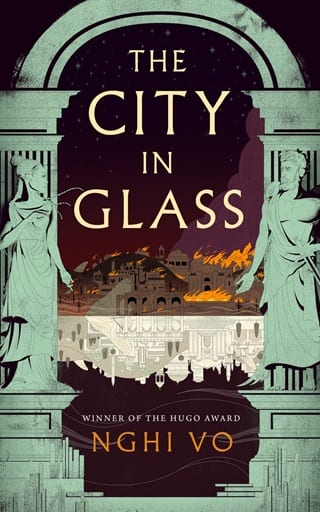Chapter Two
TWO
Because it was written at the beginning of their world that they could not die, every demon knew the trick of bringing themselves back from death. They might sight the far flags of death’s pavilions, but they knew they were not welcome, and for the second time in her life, Vitrine turned around and began her return.
Some of her siblings made the journey often enough that there was a strangely ductile quality to them, like metal which was amenable to being shaped without growing brittle. She had one sister who could shape herself a legion of bodies from a handful of grains of rice and another who could draw a real smile from sorrow. Vitrine’s siblings were brilliant and talented, but she did not have their facility for remaking herself.
In the beginning, Vitrine was a glass cabinet, six-sided and joined at the edges with dull gray lead flashing. This was the hollow inside her that all demons had, and inside that cabinet was her book. The glass cabinet was more her than her dark eyes and her mouth had been, and the book was what she had chosen to put there.
Her brother, with dark curling horns and a bull’s arch to his elegant neck, filled the hollow place inside him with a river, and whenever she embraced him, she could hear it rushing over smooth stones, hear the lowing of the oxen that drew the barges along its continent-crossing length, feel a fine spray that covered her skin with the taste of silt and moss. Another brother kept a family there, and every few years, he added some son or daughter to the throng inside. When Vitrine fought with him, she could hear their fists pounding on his ribs, their voices raised in desperate pleas for freedom.
At the bottom of the harbor, she rebuilt herself from the ships that sank in the conflagration. She found for her bones the splintered and shattered pieces of the broken masts and sterns, and on that frame, she slathered layers and layers of harbor mud. For her hair, she stole the burned ropes from the ships’ rigging, long round braids that swung past her shoulders, and by then she had hands and fingers that could sculpt for her a face, plump cheeks, wide flat nose, and a round and wise forehead.
Vitrine had no eyes until she came to shallower water, and her questing fingers found two marbles of black glass, frosted from their time in the waves. She put them in her head, and she was as complete as anything less than an angel could be. Wading out of the harbor, she caught up a shred of sail to wrap around her hips, and then she stood on the beach, staring at what was left.
The sun was just below the horizon, and the light over the city was a soft gray dream, a time of unreality where you might believe anything. For one terrible moment, Vitrine allowed herself to believe that it was not as bad as she knew it was. There might still be survivors among the crumbled towers, there might still be something living, something that remained.
Then the sun rose a little higher, streaking the sky with gold and giving the lie to her brief moment of hope. The air was heavy with the smell of char, and everyone in Azril was dead.
Vitrine’s new legs collapsed underneath her, and she fell to the beach, still looking at the broken city and trying to quell the voice in her mind that refused to believe that it was gone, all gone, almost three hundred years of work and care lost in one terrible moment…
She was listening so hard for some sign that it was not over that she heard the crunch of footsteps on the friable rock path above her immediately. The promenade on the high edge of the beach had been a place for people to stroll and preen and to watch their ships come in. It was clad in stern stone, and there had been dozens of names chipped into the high sides where they sank into the sand. Now the blasted rock crumbled like ancient limestone, and the angels that walked along the path left cracked footprints in their wake.
Numbly, Vitrine watched as they walked along the promenade, virtuous and self-contained as the anchoresses who lived in the chambers honeycombing the northern cliff of the city. Baskets hung from pulleys next to the anchoresses’ open cells, and daily, food and water would be sent up and their wisdom, scratched on little bark slips, would be sent back down.
Where they had once lived, Vitrine reminded herself, staring at the progression of angels. Her anchoresses had once lived in the northern cliff. Some of them had been women weary of the world, some of them had only been weary of trying to scrape a living from it, and some of them, some very rare number of them, had been actual mystics, writing words of power and comfort and command with thin oak-gall ink. Vitrine had never quite taken the time to sort each from each, so they were all special to her, all beloved, all perfect, and the angels made her think of their names written in her book.
The angels walked the promenade as if they hadn’t seen her. They were already growing and changing, their limbs lengthening and their heads filling with light. Their radiance was a weight on her unworthy shoulders, and defiantly, Vitrine struggled to her feet, tottering forward so that she could at least be upright as they went by. She tried to find the strength to curse them, but her tongue and her lips were still too new for it.
All Vitrine could do as they left her city was stare after them with her eyes burning, with her nails digging into her lineless palms and her legs trying to collapse out from underneath her like a sickly foal’s.
As the first vanished from view to some other place, the angel at the end of the line inexplicably turned. He was more light than human then, but she could still make out the smudge of a beard, the finely shaped skull, and the deep eyes. He was the one who had spoken to her, who had wanted to know if she would beg for nothing, and a cry tore heedless past her throat.
Vitrine nearly fell on her face as she bent to scoop up a piece of slag, but when she threw it, she struck true. The stone hit the angel’s forehead like a bolt delivered from a sling, and his head rocked back sharply. If he were a human, it would have killed him, but instead he only looked at her through a veil of blood that rolled down to cover his face.
Vitrine would have shouted curses at him again, but their eyes locked, and suddenly she no longer needed the words. A piece of herself, some dark and deadly and spiteful piece, flew from her and into his eyes, making her a part of him, and for the second time in as many seconds, he flinched in shock. His face was bloody, and her curse would live inside for as long as he would last, which was to say, she would live inside him forever.
Vitrine fell to the sand again, exhausted, the furthest thing from satisfied, but she knew that it was all she could do. She would never be anything like happy again with the city pulled down in front of her, but it would serve.
She curled on the still-warm beach as the angels passed from Azril. She swirled her fingers through the sands, marking esoteric patterns that hurt her eyes. Behind her, the seas still pounded the cliffs, and foreign gulls had already come in from the nearby islands, looking for territory that had too long been held by the city birds.
Vitrine inspected the grief left behind. It was an enormous thing, and when she closed her eyes, it took the shape of a ghost-ward, a tall and straight post hung with the artifacts of those who had gone on. After the wars, they used to spring up like wildflowers in the places of the great battles, where the mourning came to honor their dead. They were easy prey for looters, however, and eventually they fell out of fashion, though it was still possible to come across one unawares in the odd corners of Imanea, where the forests were very deep and strange.
The ghost-ward for Azril would be taller than the tallest mast, and it would be hung with wealth from a dozen foreign cities. There would be lanterns dangling from its yew shaft and so many bones inlaid into the wood that it would have a dusky white glow all its own. Azril’s ghost-ward would be the finest ever made, strung with jewels and carved with noble names going back to the city’s founding.
It was too large, Vitrine realized with dismay, to fit in the glass cabinet of her heart, too large by far even if she removed her book, which she had no intention of doing. It towered too tall for her to begin to lift, and even if she tried, it would crush her indifferently under its weight.
If it were a real thing, and not a shape that lived inside her, it would be taller than the mayor’s house, thicker than the girth of the shy and secretive mastodons that still roamed in the north. It would sink deep into the sand and rise up into the bright blue sky.
The sky is still blue, Vitrine thought, looking up. I am not sure that the sky should still be allowed to be blue.
One of her sisters could conceal the moon by sliding her lucky gold coin across its face. Another sister could, with one long breath drawn from the very core of her, blow out the sun for a few minutes.
Vitrine knew she was not as powerful as either of them. She could not change the clear blue of the sky to something more suitable, and she could not build a ghost-ward so great it would hold the depths of her mourning. Instead, she turned back to the city.
“Well, every moment I waste shall be counted against me in the days to come,” she said. It sounded wise, like something her sisters Ashabath and Lili might say. It occurred to her for a fleeting moment that they would never be here in her situation, dressed in mud and ship’s bones, crying with frustration at what was behind her and what was to come.
They never would have loved Azril as I did, either, came the defiant thought, and that gave Vitrine some strength as she made her way towards the broken towers.
 Fullepub
Fullepub 



